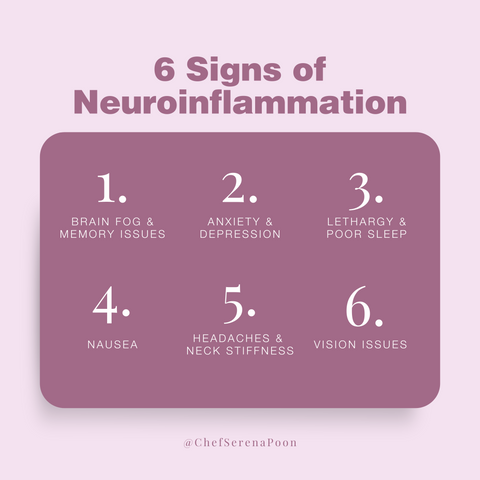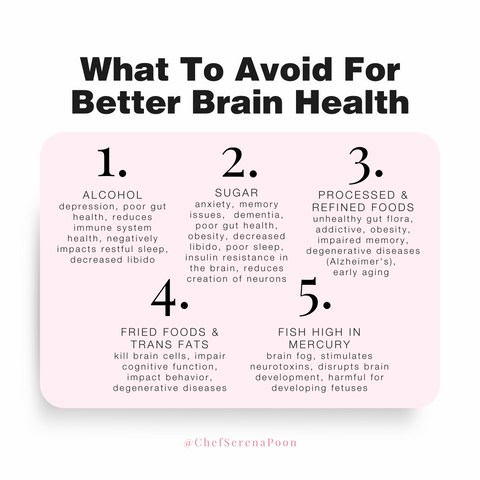Right now is the time to take steps to protect your brain health using B12 Strong. What you eat and the decisions you make regarding your wellness will affect your brain health years from now. Everything from getting restful sleep, to reducing stress, to the food you eat can deter degenerative diseases. You’ll even notice changes right away. Wouldn’t it be nice to wake up without brain fog? Remember what you were about to say a minute ago before you forgot? Be in a positive mood naturally most days? Trust your immune system to fight off viruses floating around? Stop that habit of overeating? These are all symptoms of neuroinflammation.
In this blog you will learn the 5 foods that are proven to deteriorate brain health, what neuroinflammation is, and get a list of foods and habits to support a healthy brain. For additional strategies, explore these Biohacks for brain health to enhance your cognitive function from the comfort of home.
NEUROINFLAMMATION
Neuroinflammation is inflammation in the brain that causes corresponding behavioral, biochemical, and physiological conditions. Your brain has its own immune system, immune cells in your central nervous system, that signal inflammation.
Just as the inflammation response in your body is inherently a good thing, brain inflammation has both negative and positive benefits.
SIGNS OF NEUROINFLAMMATION
Your brain can’t tell you it’s in pain due to inflammation, however, you will get signals when your brain is suffering from the effects of chronic inflammation. What are those signs?
- Brain fog and impaired memory
- Anxiety and depression
- Lethargy and sleep issues
- Nausea
- Headaches and neck stiffness
- Vision issues

It is very important to understand that inflammation isn’t inherently a harmful thing. Having zero inflammation is not the goal. In fact, inflammation is meant to protect and serve you! Your brain has its own immune system with controlled inflammatory responses that affect these processes positively:
- Immune system surveillance and telling your body to get ready to fight a virus
- Remodeling cells after an injury
- Learning, development, and memory
However, when inflammation in your brain becomes chronic due to lifestyle, toxins, and poor nutrition, it is a destructive force:
- Neurodegenerative disease (memory loss and cognitive impairment)
- Mental health disorders (anxiety & depression)
- Autoimmune disorders
- Obesity
- Aging
5 FOODS TO AVOID FOR BETTER BRAIN HEALTH
- Alcohol – When you drink alcohol it goes straight to your brain. Alcohol directly affects a region of your brain called the amygdala, which is responsible for emotion, behavior, and motivation. Chronic alcohol intake also compromises your brain’s immune cells and the resulting damage fuels anxiety.
- Sugar – A diet high in sugar has been shown to lead to neurodegenerative diseases, insulin resistance in the brain, as well as a reduction in brain function, memory, learning and the formation of brain neurons. It also leads to a loss of neurons, which in turn leads to Alzheimer’s Disease.
- Processed and refined foods – This list includes processed meats, packaged foods, processed grains, flours – anything that is highly processed and refined and no longer in its natural form. Processed foods tend to have highly reduced nutritional value and also are harmful to your microbiome. A gut full of bad bacteria will send signals to your brain that you need more unhealthy foods and also cause mood disorders. The effects of a diet high in foods like this include oxidative stress, mood disorders, depression, and the onset of neurodegenerative processes. To counter this effect you should choose these gut supplements.
- Fried foods – Foods that have been cooked at high temperatures in vegetable oils cause damage to the blood vessels bringing blood to your brain. Fried foods are high in omega-6 fatty acids that cause inflammation in the brain. These vegetable oils are often full of chemicals, pesticides, and additives that cause mood disorders and lead to degenerative diseases.
- Fish high in mercury levels – Swordfish and tuna are two types of fish to avoid or eat much less of. Unlike fatty fish that are high in omega-3’s and great for brain health boost like Love My Brain, these fish are high in mercury, which is neurotoxic and proven to cause brain fog, disrupt brain development, and harm developing fetuses.

WHAT TO EAT FOR A BETTER MOOD
More and more studies are proving how what you eat affects your brain health. For example, in a recent study from Edith Cowan University (ECU) it was found that eating a diet rich in fruit and vegetables is associated with less stress and contributes to better mental health and wellbeing.
In my method, Culinary Alchemy®, we focus on nutrient-dense plant foods that support all of your body’s organ systems. Here are a few recipes you can start with to begin eating for brain health : GET THE RECIPES
Here is a short list of what to include in your diet that has been proven to support mental health, memory, and brain health!
- Blueberries & blueberry juice – fight dementia, prevent Alzheimer’s
- Leafy greens & foods high in folate – improve neurotransmitter function, improve mood, sharper mind
- Probiotics & prebiotics – your gut microbiome affects your brain health through the gut-brain axis, balances hormone levels with Love My Adrenal, improves mood
- Turmeric – reduces inflammation, promotes neurotrophic activities, fights symptoms of fatigue, anxiety, and depression
- Oily fish – Omega-3’s improve the structure of neurons, improve cognitive skills
- Nuts & seeds – Vitamin E and omega-3’s reduce oxidative stress, improve cognition, reduce chances of Alzheimer’s
- Dark chocolate – antioxidants support brain health, increases dopamine, learning, memory, and mindfulness
- Berries – antioxidants improve plasticity, improve communication between brain cells, reduce chances of neurodegenerative diseases
- Water – your brain is the first organ to receive water, even a 1% drop in dehydration impairs brain function
- Cruciferous veggies – high in sulforaphane to support gut health, support your immune system, improve focus, reduce the progression of Alzheimer’s.
IN CLOSING
If you want to live a long, vibrant life, having a healthy functioning brain should be a priority. Eating the rainbow (consuming a diet of colorful, mostly plant-based whole foods), reducing stress, engaging in meaningful relationships, and having an active lifestyle will all help you in achieving that.
by





